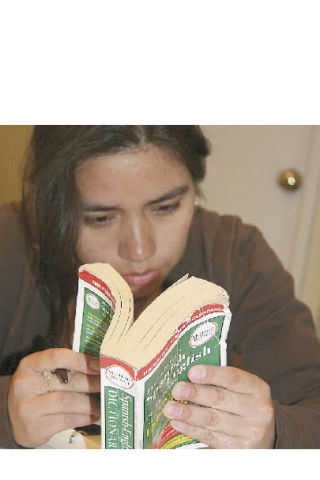An April downpour didn’t stop Liliana Reyes from catching public transportation from her Snoqualmie Ridge home to St. Clare Episcopal Church for a free English class the church sponsors every Tuesday evening.
Reyes, who is from El Salvador, had recently spent 10 days visiting her parents in Honduras — and speaking only Spanish — and joked with her German classmates that her English had gotten rusty.
To warm up for class, the adult students, led by instructor Abbie Crane, completed a journaling exercise about a photo from National Geographic magazine. Next, Crane slowly and clearly explained the recent demolition of a building on the church’s grounds, defining tougher vocabulary words as she wrote them on a board. Then it was time to get the students talking. Occasionally cracking open an English-Spanish dictionary, Reyes shared details about her Easter vacation. She has lived and worked as a babysitter in the United States for eight months, and knows improving her English skills will ease her transition into life here.
Using a mix of careful English and the occasional German word, Gisela and Yunes Payendeh explained that they’d moved to Snoqualmie to be closer to their daughter and grandchildren. Back home in Germany, the first English vocabulary they mastered were numbers, as they racked up huge phone bills calling their daughter every day.
“It’s quite an international group,” said Crane, who is part of a team of volunteers that teaches the class. The church, with help from the non-profit human-services organization Hopelink, has taught English to students from Taiwan, China, Mexico, Japan and other countries.
“Because English is the primary language here, anybody who wants to make above a minimum wage needs to have English skills,” said Sue Borroff, who also teaches the class. She said knowing English is vital for surviving an emergency, as well as everyday life.
Earlier this spring, Borroff led a field trip to the grocery store, where students learned food- and money-related vocabulary. They’ve also recently focused on numbers and telephone skills.
“Using a telephone can be pretty scary for anyone new to this country. All you do is hear this rapid-fire language,” she said.
In addition to mastering language, the class is also about sharing culture.
“We’ve had people from many countries. It’s been a lot of fun getting to know them,” Borroff said.
At a Christmas potluck, each student brought a dish from their home countries, making for a wonderfully varied spread, Crane said.
Attendance has dipped from 10 students in the fall to three or four this spring. Borroff said she hoped more people would show up to the class, where anyone is welcome.


